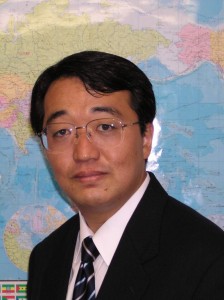緊張と統合:内村鑑三におけるキリスト教と日本の精神
このシリーズでは、私が1994年に執筆した統一神学大学院(Unification Theological Seminary)の神学課程修士論文(Divinity Thesis)を日英二か国語で掲載している。今回から「結論」に入る。
結論
我々は無教会運動を色々な言葉で描写すること事が出来るであろう。それは神秘実存主義的アプローチによって、キリスト教を日本に土着化させようとする試みである。それはピューリタンと侍の伝統の統合である。それはキリスト教版の禅であり、もしくは神道版のキリスト教である。構造的には、それは師弟関係に基づいた聖書研究会の運動である。社会学的には、それは職業的司牧も典礼も無く、カリスマ的リーダーの継承によって永続する反組織主義的な教会である。歴史的には、それは預言者の伝統の日本的な表現である。思想的には、それは個別主義に対する普遍主義の挑戦である。神学的には、それは他律に対する自律の挑戦であり、また神律への憧憬である。
無教会運動は、その支持者の数が少ないにも関わらず、西洋のキリスト教からの完全な独立と、日本の霊性の伝統的な特質との近さという両面において重要な意味を持つ。それはまた、静かで目立たないが力強い影響を日本のキリスト教に与えて来た。今日、自分の書棚に内村の最も有名な著作と、無教会の学者たちによる聖書に関する著作を置いていないプロテスタントの牧師は、ほとんどいないと言っていい。預言者たちの言葉が彼らの時代ではなく、後の時代に評価されたように、内村と無教会キリスト教の日本の文明に対する貢献は、歴史的な重要性を持っているのである。
内村は突如として洪水の様に押し寄せてくる西洋思想の洗礼を受けた「明治日本の新世代」の一人であった。それは彼らに深刻な文化的アイデンティティーの危機をもたらした。この「新世代」の多くにとって、彼らの文化的、個人的なアイデンティティーの危機の単純な解決は、日本が日清戦争(1894ー1895)で劇的な勝利を収め、日本が西洋から強力な近代国家として認められた後に可能となった。しかし極く小数の感受性の強い者たちにとっては、帝国主義的な日本民族国家という意味での独立国の概念による解決は、彼らが初めから信奉してきた日本に対する(規範的な)理想とは相容れなかったのである。内村はこの「新世代」の中でも最も感受性の強い者の一人であった。
土着化の観点からすれば、内村は神と文化の関係に関する最初の二つの極端なタイプ(「文化に対するキリスト」と「文化のキリスト」)に対して、一貫して反対した。無教会運動は西洋の宣教師達の『神は私の文化を支持している』という見解に対する反発であったし、また日本のキリスト教徒の中にいる嘆かわしい「無定形の普遍的人間」や、「国籍を失った日本人」の『文化に対する神』の立場に反対したものでもある。彼の不敬事件とそれに引き続く日本の国体との相克は、キリスト教が日本の文化的環境の中に崩壊してしまうことに対する抵抗であった。第二次世界大戦中に権力に迎合し、宗教的な言葉をもって軍国主義を正当化しようとしたキリスト者達の御都合主義に反対して、預言者の精神と良心とをもって警笛を鳴らしたのは、矢内原忠雄の率いる無教会運動であった。
内村にとってキリスト教は、特定の歴史的実在から独立した超越的で普遍的な宗教であった(「文化の上にあるキリスト」の立場)。彼は若き日にキリストと日本を、さらには世界文明の二大潮流である東洋と西洋を和解させる『総合主義者』たらんと夢見た。しかし彼の西洋文明に対する無邪気な夢は、彼のアメリカ滞在中に打ち砕かれた。彼の日本に対する無批判の愛もまた、不敬事件とそれに引き続く「不義なる日本」との直面によって破壊された。彼の生涯において最も活動的であった期間、彼は『回心主義者』の立場をとり、日本社会の道徳的預言者として働いた。
Conclusion
We may be able to illustrate the Mukyokai movement in many ways. It is an attempt of indigenization of Christianity in Japan by a mystico-existential approach. It is a synthesis of the puritan and samurai traditions. It is a Christian version of Zen, or a Shintoist version of Christianity. Structurally, it is a movement of Bible study groups based on teacher-pupil relationships. Sociologically, it is an anti-organizational church, without professional ministry and sacraments, perpetuated through a succession of charismatic leaders. Historically, it is a Japanese expression of the Prophetic tradition. Ideologically, it is a universalistic challenge against particularism. Theologically, it is a challenge of autonomy against heteronomy; and also a yearning for theonomy.
Despite their small number of adherents, the Mukyokai movement is significant both for its complete independence from western Christianity and its closeness to the traditional features of Japanese spirituality. Also, it has had a silent and invisible, but powerful influence on Japanese Christianity. These days, there is virtually no Protestant minister whose personal library does not contain Uchimura’s most popular books plus some biblical works by Mukyokai scholars.(1) As the words of the Prophets were appreciated not by the people of their age but by later generations, the contribution of Uchimura and the Mukyokai Christianity to Japanese civilization has an historical significance.
Uchimura was one of “the new generation in Meiji Japan,” who suddenly found themselves immersed in a flood of Western ideas, which led them to a severe cultural identity crisis. For many of the “new generation” a simple resolution of their cultural and personal identity crisis became possible after Japan’s dramatic victory in the Sino-Japanese war (1894-1895) that led to the recognition of Japan by the West as powerful, modern nation-state. However, for a few sensitive individuals the resolution of the meaning of nationhood in terms of an imperialistic Japanese nation-state was incompatible with the (normative) ideal of Japan that they had espoused from the beginning. Uchimura was one of the most sensitive of the “new Generation.”(2)
From the viewpoint of indigenization, Uchimura was steadily opposed to the first two extreme types of understanding of God’s relation to culture (Christ against culture and Christ of culture). Mukyokai movement was a reaction against the God-endorsing-my culture perspective of the western missionaries, as well as the God-against-culture position of the lamentable “amorphous universal men” or “denationalized Japanese” among Japanese Christians. His Lese Majesty Incident and the subsequent conflict with national polity of Japan was a resistance against the collapse of Christianity into the Japanese cultural milieu. It was Mukyokai movement, lead by Tadao Yanaihara, that rung an alarm bell, with prophetic spirit and conscience, against the opportunism of Christians under World War II who accommodated itself to ruling power and tried to rationalize militarism in religious terms.
For Uchimura, Christianity was a transcendent or universal religion, independent of particular historical realities. (Christ above culture position). As a young man he dreamed to be a synthesist of Christ and Japan, as well as the two great streams of world civilization, of reconciling the East and West. However, his naive dream of western civilization was broken during his stay in the United Sates. His uncritical love for Japan was also crushed by the Lese Majesty Incident and the subsequent confrontation with “unrighteous Japan.” In his most active lifetime, he took the position of conversionist, acting as a moral prophet of Japanese society.
(1)op cit, Caldarola, p.209
(2)op cit, Robert Lee, p.92.
